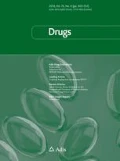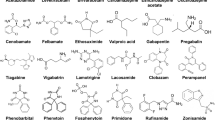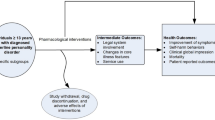Abstract
Several ‘new’ antiepileptic drugs (AEDs), i.e. oxcarbazepine, vigabatrin, lamotrigine, zonisamide, gabapentin, tiagabine, topiramate and levetiracetam have been introduced into clinical practice within the last decade. Most of these new drugs are at least as effective as the ‘old’ AEDs [phenytoin, phenobarbital (phenobarbitone), valproic acid (sodium valproate) and carbamazepine] and, in general, they seem to be better tolerated than the old drugs. The new AEDs might have less influence on cognitive functions but the aspect has not been systematically studied.
Neuropsychological testing has been the major method of objectively examining cognitive function related to the use of AEDs but a number of methodological problems blur the results. Alteration of cognition might reflect a chronic adverse effect of AEDs but the negative effects of the drugs are only one of several factors that may influence cognition. In addition, subjective complaints about cognitive deficits (e.g. memory problems or attention) may also reflect other aspects of adverse effects than those concerning specific cognitive functions (e.g. mood and anxiety).
This review focuses on studies of the cognitive effects of the new AEDs, and in particular on studies that compare cognitive effects of the old and new drugs.
In general, the new AEDs seem to display no or minor negative cognitive effects. In studies in which new AEDs have been compared with old AEDs, there was a tendency in favour of the new AEDs in some of the studies.

Similar content being viewed by others
References
Dam M, Ekberg R, Løyning Y, et al. A double-blind study comparing oxcarbazepine and carbamazepine in patients with newly diagnosed, previously untreated epilepsy. Epilepsy Res 1989; 3: 70–6
Brodie MJ, Richens A, Yuen A. Double-blind comparison of lamotrigine and carbamazepine in newly diagnosed focal epilepsy. Lancet 1995; 345(8948): 476–9
Tanganelli P, Regesta G. Vigabatrin vs carbamazepine monotherapy in newly diagnosed focal epilepsy: a randomized response conditional cross-over study. Epilepsy Res 1996; 25(3): 257–62
Chadwick DW, Anhut H, Greiner MJ, et al. A double-blind trial of gabapentin monotherapy for newly diagnosed partial epilepsy. Neurology 1998; 51: 1282–8
Marson AG, Chadwick DW. New drug treatments for epilepsy. J Neurol Neurosurg Psychiatry 2001; 70(2): 143–7
Trimble MR. Quality of life and cognitive function. In: Trimble MR, Dodson WE, editors. Epilepsy and quality of life. New York: Raven Press Ltd,1994
Aldenkamp AP, Hendriks M. Managing cognitive and behavioural consequences of epilepsy. In: Baker GA, Jacoby A, editors. Quality of life in epilepsy. Amsterdam: Harwood Academic Publishers, 2000
Äikiä M, Kälviäinen R, Sivenius J, et al. Cognitive effects of oxcarbazepine and phenytoin monotherapy in newly diagnosed epilepsy: one year follow-up. Epilepsy Res 1992; 11(3): 199–203
Kälviäinen R, Äikiä M, Saukkonen AM, et al. Vigabatrin vs carbamazepine monotherapy in patients with newly diagnosed epilepsy: a randomized, controlled study. Arch Neurol 1995; 52(10): 989–96
Sabers A, Moller A, Dam M, et al. Cognitive function and anticonvulsant therapy: effect of monotherapy in epilepsy. Acta Neurol Scand 1995; 92(1): 19–27
Akaho R. The effects of antiepileptic drugs on cognition in normal volunteers. Psychiatry Clin Neurosci 1996; 50(2): 61–9
Dodrill CB, Arnett JL, Shu V, et al. Effects of tiagabine monotherapy on abilities, adjustment, and mood. Epilepsia 1998; 39(1): 33–42
Meador KJ, Loring DW, Ray PG, et al. Differential cognitive effects of carbamazepine and gabapentin. Epilepsia 1999; 40(9): 1279–85
Aldenkamp AP, Baker G, Mulder OG, et al. A multicenter, randomized clinical study to evaluate the effect on cognitive function of topiramate compared with valproate as add-on therapy to carbamazepine in patients with partial-onset seizures. Epilepsia 2000; 41(9): 1167–78
Dodrill CB, Arnett JL, Deaton R, et al. Tiagabine versus phenytoin and carbamazepine as add-on therapies: effects on abilities, adjustment, and mood. Epilepsy Res 2000; 42(2-3): 123–32
Meador KJ, Loring DW, Ray PG, et al. Differential cognitive and behavioral effects of carbamazepine and lamotrigine. Neurology 2001; 56: 1177–82
Vermeulen J, Aldenkamp AP. Cognitive side-effects of chronic antiepileptic drug treatment: a review of 25 years of research. Epilepsy Research 1995; 22: 65–95
Meador KJ, Loring DW. Cognitive effects of antiepileptic drugs. In: Devinsky O, Theodore WH, editors. Epilepsy and behavior. Frontiers of clinical neuroscience, vol.12. New York: Wiley-Liss Inc, 1991
Dodrill CB. Problems in the assessment of cognitive effects of antiepileptic drugs. Epilepsia 1992; 33 Suppl. 6: 29–32
Cochrane HC, Anthony GM, Baker GA, et al. Neuropsychological outcomes in randomized controlled trials of antiepileptic drugs: a systematic review of methodology and reporting standards. Epilepsia 1998; 39(10): 1088–97
Thompson PJ. Antiepileptic drugs and memory. Epilepsia 1992; 33 Suppl. 6: 37–40
Trimble MR. Anticonvulsant drugs and cognitive function: a review of the literature. Epilepsia 1987; 28 Suppl. 3: 37–45
Vinning EPG. Cognitive dysfunction associated with antiepileptic drug therapy. Epilepsia 1987; 28 Suppl. 2: 18–22
Voorhies TM. Cognitive and behavioral effects of antiepileptic drugs. Semin Neurol 1988; 8(1): 35–40
Smith DB. Cognitive effects of antiepileptic drugs. In: Smith D, Treiman D, Trimble MR, editors. Advances in neurology. New York: Raven Press Ltd, 1991
Drane DL, Meador KJ. Epilepsy, anticonvulsant drugs and cognition. Baillieres Clin Neurol 1996; 5(4): 877–85
Dodrill CB, Troupin AS. Neuropsychological effects of carbamazepine and phenytoin: a reanalysis. Neurology 1991; 41: 141–3
Trimble MR. Anticonvulsant drugs: mood and cognitive function. In: Trimble MR, Reynolds EH, editors. Epilepsy, behaviour and cognitive function. Stratford-upon-Avon Symposium; 1987 Nov. Chichester, England: John Wiley & Sons, 1988: 135–43
Dreifuss FE. Cognitive function: victim of disease or hostage to treatment? Epilepsia 1992; 33 Suppl. 1: 7–12
Schechter PJ, Hanke NFJ, Grove J, et al. Biochemical and clinical effect of gamma-vinyl GABA in patients with epilepsy. Neurology 1984; 34: 182–6
Kälviäinen R, Nousiainen I, Mäntyjärvi M, et al. Vigabatrin, a gabaergic antiepileptic drug, causes concentric visual field defects. Neurology 1999; 53: 922–6
Rémy C, Beaumont D. Efficacy and safety of vigabatrin in long-term treatment of epilepsy. Br J Clin Pharmacol 1989; 27: 125–9
Tatara A, Manni R, Calimberti CA, et al. Vigabatrin in the treatment of epilepsy: a long-term follow-up study. J Neurol Neurosurg Psychiatr 1989; 52: 467–71
McGuire AM, Duncan JS, Trimble MR. Effects of vigabatrin on cognitive function and mood when used as add-on therapy in patients with intractable epilepsy. Epilepsia 1992; 33(1): 128–34
Gillham RA, Blacklaw J, McKee PJ, et al. Effect of vigabatrin on sedation and cognitive function in patients with refractory epilepsy. J Neurol Neurosurg Psychiatry 1993; 56(12): 1271–5
Dodrill CB, Arnett JL, Sommerville KW, et al. Evaluation of the effects of vigabatrin on cognitive abilities and quality of life in epilepsy. Neurology 1993; 43(12): 2501–7
Dodrill CB, Arnett JL, Sommerville KW, et al. Effects of differing dosages of vigabatrin (Sabril) on cognitive abilities and quality of life in epilepsy. Epilepsia 1995; 36(2): 164–73
Ylinen A, Kälviäinen R, Riekkinen Sr PJ. Long-term efficacy and cognitive effects of vigabatrin. Acta Neurol Scand 1995; 92 Suppl. 162: 47–50
Provinciali L, Bartolini M, Mari F, et al. Influence of vigabatrin on cognitive performances and behaviour in patients with drug-resistant epilepsy. Acta Neurol Scand 1996; 94(1): 12–8
Monaco F, Torta R, Cicolin A, et al. Lack of association between vigabatrin and impaired cognition. J Int Med Res 1997; 25(5): 296–301
Xie X, Lancaster B, Peakman T, et al. Interaction of the antiepileptic drug lamotrigine with recombinant rat brain IIANa+ channals and native Na+ channals in rat hippocampal neurones. Pflugers Arch 1995; 430: 437–46
Messenheimer J, Mullens EL, Giorgi L, et al. Safety review of adult clinical trial experience with lamotrigine. Drug Saf 1998; 18(4): 281–96
Smith D, Baker G, Davies G, et al. Outcomes of add-on treatment with lamotrigine in partial epilepsy. Epilepsia 1993; 34(2): 312–22
Banks GK, Beran RG. Neuropsychological assessment in lamotrigine treated epileptic patients. Clin Exp Neurol 1991; 28: 230–7
Martin R, Kuzniecky R, Ho S, et al. Cognitive effects of topiramate, gabapentin, and lamotrigine in healthy young adults. Neurology 1999; 52(2): 321–7
Placidi F, Marciani MG, Diomedi M, et al. Effects of lamotrigine on nocturnal sleep, daytime somnolence and cognitive functions in focal epilepsy. Acta Neurol Scand 2000 Aug; 102(2): 81–6
Goa KL, Ross SR, Chrisp P. Lamotrigine: a review of its pharmacological properties and clinical efficacy in epilepsy. Drugs 1993; 46(1): 152–76
Buchanan N. The efficacy of lamotrigine on seizure control in 34 children, adolescents and young adults with intellectual and physical disability. Seizure 1995; 4(3): 233–6
Steiner TJ, Dellaportas CI, Findley LJ, et al. Lamotrigine mono-therapy in newly diagnosed untreated epilepsy: a double-blind comparison with phenytoin. Epilepsia 1999; 40(5): 601–7
Gillham R, Kane K, Bryant-Comstock L, et al. A double-blind comparison of lamotrigine and carbamazepine in newly diagnosed epilepsy with health-related quality of life as an outcome measure. Seizure 2000; 9(6): 375–9
Leary PM, Allie S. A new drug suitable for children and young people with epilepsy and intellectual impairments [letter]. Dev Med Child Neurol 1995; 37(4): 371
Beran RG, Gibson RJ. Aggressive behaviour in intellectually challenged patients with epilepsy treated with lamotrigine. Epilepsia 1998; 39(3): 280–2
Ettinger AB, Weisbrot DM, Saracco J, et al. Positive and negative psychotropic effects of lamotrigine in patients with epilepsy and mental retardation. Epilepsia 1998; 39(8): 874–7
Taylor CP. Emerging perspectives on the mechanism of action of Gabapentin. Neurology 1994; 6 Suppl. 5: 10–6
Mortimore C, Trimble M, Emmers E. Effects of gabapentin on cognition and quality of life in patients with epilepsy. Seizure 1998; 7(5): 359–64
Leach JP, Girvan J, Paul A, et al. Gabapentin and cognition: a double-blind, dose ranging, placebo controlled study in refractory epilepsy. J Neurol Neurosurg Psychiatry 1997; 62(4): 372–6
Dodrill CB, Arnett JL, Hayes AG, et al. Cognitive abilities and adjustment with gabapentin: results of a multisite study. Epilepsy Res 1999; 35(2): 109–21
Schachter SC, Cahill WT, Wannamaker BB, et al. Open label dosage and tolerability study of tiagabine monotherapy in patients with refractory complex partial seizures. J Epilepsy 1998; 11:248–55
Sveinbjornsdottir S, Sander JW, Patsalos PN, et al. Neuropsychological effects of tiagabine, a potential new antiepileptic drug. Seizure 1994; 3(1): 29–35
Kälviäinen R, Äikiä M, Mervaala E, et al. Long-term cognitive and EEG effects of tiagabine in drug-resistant partial epilepsy. Epilepsy Res 1996; 25(3): 291–7
Dodrill CB, Arnett JL, Sommerville KW, et al. Cognitive and quality of life effects of differing dosages of tiagabine in epilepsy. Neurology 1997; 48(4): 1025–31
Pritivera M, Fincham R, Penry J, et al. Topiramate placebo-controlled dose-ranging trial in refractory partial epilepsy using 600-, 800-, and 1,000 mg daily dosage. Neurology 1996; 46: 1678–83
Löscher W. New visions in the pharmacology of anticonvulsion. Eur J Pharmacol 1998; 342: 1–13
Shorvon SD. Safety of topiramate: adverse events and relationships to dosing. Epilepsia 1996; 37 Suppl. 2: 18–22
Burton LA, Harden C. Effect of topiramate on attention. Epilepsy Res 1997; 27(1): 29–32
Aldenkamp AP. Cognitive effects of topiramate, gabapentin, and lamotrigine in healthy young adults. Neurology 2000; 54(1): 271–2
Lhatoo SD, Sander JW, Wong IC. Cognitive effects of topiramate, gabapentin, and lamotrigine in healthy young adults. Neurology 2000; 54(1): 270–2
Thompson PJ, Baxendale SA, Duncan JS, et al. Effects of topiramate on cognitive function. J Neurol Neurosurg Psychiatry 2000; 69(5): 636–41
Flicker L, Grimley EJ. Piracetam for dementia or cognitive impairment (Cochrane Review). Cochrane Database Syst Rev. Available in The Cochrane Library [database on disk and CD ROM]. Updated quarterly. The Cochrane Collaboration; issue 2: CD001011. Oxford: Update Software, 2000
Birnstiel S, Wulfert E, Beck SG. Levetiracetam (ucb LO59) effects in vitro models of epilepsy in CA3 pyramidal neurons without altering normal synaptic transmission. Arch Pharmacol 1997; 356(5): 611–8
Ben-Menachem E, Falter U. Efficacy and tolerability of levetiracetam 3000 mg/d in patients with refractory partial seizures: a multicenter, double-blind, responder-selected study evaluating monotherapy. Epilepsia 2000; 41(10): 1276–83
Neyens LG, Alpherts WC, Aldenkamp AP. Cognitive effects of a new pyrrolidine derivative (levetiracetam) in patients with epilepsy. Prog Neuropsychopharmacol Biol Psychiatry 1995; 19(3): 411–9
Cramer JA, Arrigo C, Van Hammee G, et al. Effect of levetiracetam on epilepsy-related quality of life: N132 study group. Epilepsia 2000; 41(7): 868–74
Suzuki S, Kawakami K, Nishimura S, et al. Zonisamide blocks T-typed calcium channel in cultured neurons of rat cerebral cortex. Epilepsy Res 1992; 12: 21–7
Wong CK, Lhatoo SD. Adverse reactions to new anticonvulsant drugs. Drug Saf 2000; 23(1): 35–56
Berent S, Sackellares JC, Giordani B, et al. Zonisamide (CI-912) and cognition: results from preliminary study. Epilepsia 1987; 28(1): 61–7
Author information
Authors and Affiliations
Corresponding author
Rights and permissions
About this article
Cite this article
Brunbech, L., Sabers, A. Effect of Antiepileptic Drugs on Cognitive Function in Individuals with Epilepsy. Drugs 62, 593–604 (2002). https://doi.org/10.2165/00003495-200262040-00004
Published:
Issue Date:
DOI: https://doi.org/10.2165/00003495-200262040-00004




